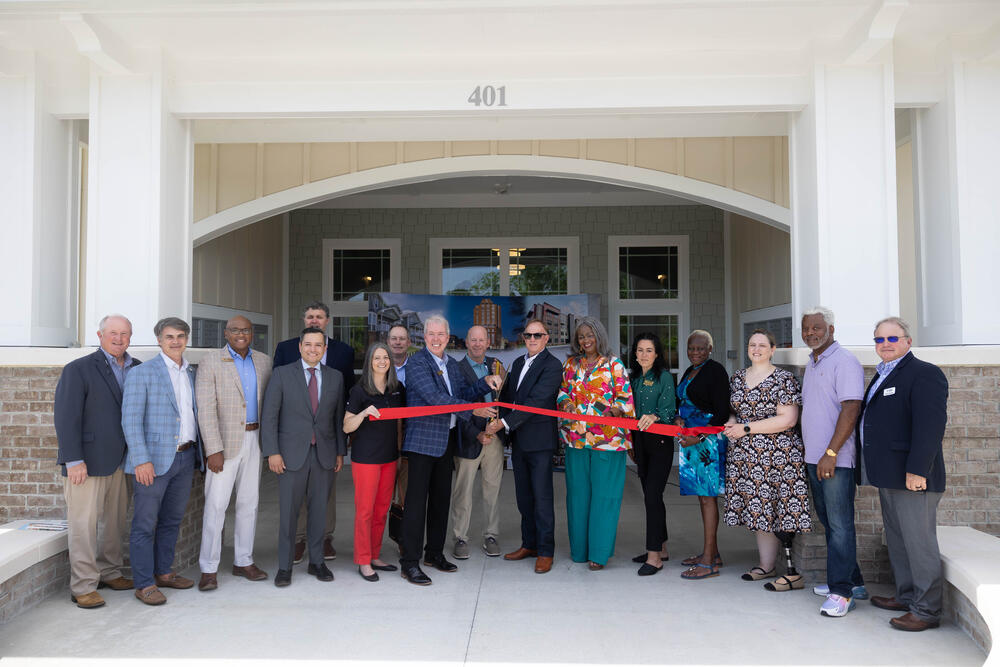
Section Branding
Header Content
New units address severe housing shortage in Valdosta
Primary Content

Safe, decent and affordable housing remains hard to find in Georgia.
While some areas of the state, especially around metro Atlanta, are building new housing units at a relatively brisk pace, other areas of the state need more units than the market is providing.
The crisis is particularly acute in South Georgia.
According to Builder’s Patch, a real estate finance company, in Valdosta’s Lowndes County, for every 100 renters, there are only three units that are affordable for “extremely low” and “very low” income residents, defined as those earning less than half the area’s median income.
A newly opened 80-unit apartment complex aims to address this gap.
Officials responsible for getting it built say Georgia can learn a lot from how the project, called Harvest Station Apartments, came together.
“Our city council and city leadership were committed to addressing the daunting challenge,” Valdosta Mayor Scott James Matheson said. “When the right project and the right partners presented themselves, we matched their dream with ours.”
The public and private partners behind Harvest Station say the apartments would not have been built without millions of dollars in federal, state and local assistance.
The $18 million project received about $1 million in federal and state housing tax credits from the U.S. Department of Housing and Urban Development (HUD) and the Georgia Department of Community Affairs (DCA).
The City of Valdosta and the Valdosta Housing Authority also allocated about $3 million of federal American Rescue Plan Act (ARPA) funds to purchase the land and make a loan to develop the units.
But for projects going forward, the future of federal support is in doubt with pandemic-era ARPA funding gone and HUD staff largely gutted in the second Trump administration.
The president of the company that developed the complex, Rhett Holmes of IDP Properties, said he believes bipartisan support for affordable housing in Congress will prevent President Trump from making significant cuts.
“He tried that in his first administration that didn’t get approved,” Holmes said. “So I don't think all of the modifications or cuts he’s looking to do currently are going to go through.”
But he emphasized that there’s more to building affordable housing than just federal and state dollars.
He said that local governments, also, need to be at the table.
Take those tax credits, for example. He said, to some local tax assessors, they look a lot like income.
“They’re basically trying to value the tax credit as income, which they’re not,” he said. “Lowndes County is one of the handful of counties that does it that way.”
Harvest Station was able to work with local officials to lower its tax burden through a payment in lieu of taxes.
“Otherwise, this type of property would not be financially feasible in Lowndes County because the property taxes will be too high,” he said.
Holmes also cites excess regulation and rising insurance costs — two issues that state lawmakers addressed in the 2025 General Assembly — as hindrances to building affordable housing.
One of Gov. Brian Kemp’s top legislative priorities for the year, a bill to limit liability lawsuits and aimed at tackling insurance costs, was passed and signed into law.
For his part, one of Lt. Gov. Burt Jones’s top legislative priorities for the year, the Red Tape Rollback Act, aimed to tackle state regulations. It passed in the Senate but never received a floor vote in the House.
“There’s no silver bullet to the fix,” Holmes said. “It’s got to be worked on at multiple levels.”
Meanwhile, last week, the Georgia Department of Community Affairs announced another $13 million in federal funds would be going to 15 communities for new housing projects.
The money comes from HUD’s Community Home Investment Program and was directed by DCA mostly to areas outside of metro Atlanta.
They include the South Georgia cities of Americus, Bainbridge, Boston, Brunswick and Tifton, plus Albany’s Dougherty County. along with northward areas around Gainesville, Warner Robins and Columbus.
These regions are consistent with those identified in a 2023 DCA “Housing Needs Assessment” as “high opportunity / low market activity,” meaning, there’s a gap in what the housing needs are compared to what private developers are willing to take on.
Once complete, by the fall of 2026, Harvest Station Apartments is expected to have 180 units.

